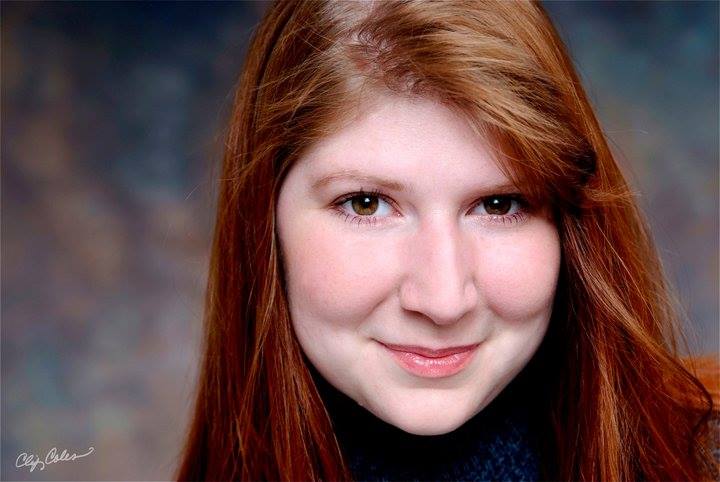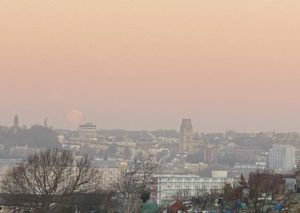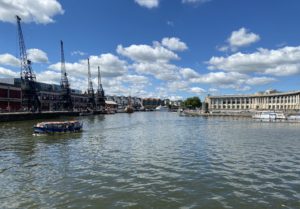
When I paid my $10 and settled down to watch the online ROCopera Song Cycle Festival event called Dickinson Songs I was expecting a fairly straightforward rendition of Copland’s 12 Poems of Emily Dickinson. What I didn’t expect was to be knocked sideways!
Instead of simply watching soprano Heather Holmquest and the “most excellent collaborative” pianist Chris Petit run through what has become a very familiar soundscape, I was treated to eight of the songs done as videos – some montages of images and some of Holmquest singing to the camera in various settings – in a church, in her bedroom, bored sitting by a piano and in a graveyard.
However, it was the link with Covid-19 that was the Eureka aspect. I watched the interview prior to the songs and she mentioned that the cycle was new to her and she had picked out ones that were appropriate to our current situation. In particular, Holmquest said that Why do they shut me out of heaven? which has the next line “Because I sing too loud” was very appropriate for her as a singer as like so many artists, her ability to perform has been taken away from her and she has had to come up with novel ways to keep her career from being completely on hold. I was intrigued but in truth I was expecting only oblique connections between the songs and the current global pandemic.
How wrong I was. Song after song seemed to have the most amazing prescient words which were subtitled onto the videos which really helped shape the narrative of each piece. It was in short another fine artistic response to Covid 19. Unlike the performance of Quiet City by Winston-Salem Symphony and dancers Gavin Stewart and Vanessa Owen, the production qualities here are not nearly so slick but in some ways that added to the overall significance of the recital. In the final credits you realise that Holmquest had a hand in all aspects of the project which again sums up the need for resilience and versatility in these testing times. So, yes it may be low budget but it certainly had a high impact on me.
So what makes Emily Dickinson and her poems so relevant to Covid-19? Well, for so much of her life she lived in a self-imposed lockdown, socially isolated, reclusive, housebound, lonely and fearful of death. In addition, like so many of us during our own lockdown experience she became keenly aware of nature, the singing birds, changing seasons and emergence of blossom. Her writing, brilliantly set to music by Copland, encompasses all these themes and certain lines are so incredibly apt that they could have been written in the last year.
The cycle was not in the normal order but started as per usual with Nature, the Gentlest Mother and finished with The Chariot. Nature, the Gentlest Mother included lovely montages of birds, flowers and trees and was a reminder, if we need it of our wonderful planet and the neglect we have shown such a nurturing home.
Dear March Come In begins with a spinning, knitted representation of the SARS-CoV-2 virus and then is followed by images and TV newsreel scenes from the beginning of the pandemic in March 2020. It’s incredible that just like Emily Dickinson welcoming in March with haste, that many countries were simply overwhelmed by the speed of the spreading virus and unable to “Lock the door” in time.
I got your Letter, and the Birds –
The Maples never knew you were coming – till I called
I declare – how red their Faces grew –
The line “There was no purple suitable” is accompanied by an image of Holmquest wearing a purple face mask again reminding us that her instrument has been forcibly silenced.
The poem concludes with the lines
That Blame is just as dear as Praise
And Praise as mere as Blame
Reminds us that despite the inadequacy of some responses by Governments’ and the selfish actions of a few individuals that we are all in this together.
Why Do They Shut Me Out Of heaven has Holmquest all dressed up with nowhere to go. Despite her entreaties to enter the heaven of performing, the song ends with her dejectedly closing the piano lid. I think we can all relate to the boredom, frustration and listlessness that she puts across.
I have always interpreted Heart, We Will Forget Him as a melancholy yearning for an unrequited lover. However, in this context it’s hard not to imagine someone trying, but failing to move on from the incredible vacuum left by the loss of a loved one to Covid. It’s heart breaking.
You may forget the warmth he gave,
I will forget the light
Sleep Is Supposed To Be shows Holmquest anguishing over insomnia waiting for a morning that simply won’t come soon enough. I Felt A Funeral In My Brain is suggestive of a terrible Covid induced delirious nightmare. It concludes with the line
Wrecked, solitary, here.
which is surely how some patients must have felt whilst ravaged by the disease.
When They Come Back has more imagery of spring flowers and bees. The winter has been such a long and tortuous struggle that like Dickinson, one finds themselves scarcely believing that we will ever come out the other end into a glorious spring.
When they come back if Blossoms do
I always feel a doubt
If Blossoms can be born again
When once the Art is out
The Chariot was the first Dickinson poem that Copland set and was his favourite, as it is mine. Here, Holmquest finds herself in a cemetery in the waning afternoon sunlight, alone but for the headstones and a family of roe deer. At one point the camera settles on a tombstone and pans up to reveal Mary caressing a Cross. The aged stone for all the world makes it look like Mary is wearing a face mask. It’s a really poignant moment.
There are two parts of the poem that really encapsulate lockdown for me. The first couplet which reminds me of the sorrow I feel for my daughter’s near year of studying at home alone, online and for the most part unable to meet up with her friends.
We passed the school where children played,
Their lessons scarcely done
We passed the fields of grazing grain,
We passed the setting sun.
The other part conjures with that amazing contradiction that the days drag on endlessly but the weeks and months seemingly vanish into the dust created by the accelerating chariot.
Since then ‘tis centuries; but each
Feels shorter than the day
I must admit I was completely bowled over by this setting of the 12 Poems of Emily Dickinson and having seen it (several times now) I am really surprised that no one else has done something like this. So hats off the ROCopera for putting this together – the ability to see such creativity, talent and ingenuity like this online has, for me been one of the saving graces of the whole Lockdown nightmare.
I heartily recommend you watch this but if you do please make a donation so these artists can continue to work and produce more exemplary content.







Blog Comments
Heather Holmquest
29th August 2023 at 7:29 am
Oh my goodness! Thank you so much!! I am so glad you appreciated what I was trying to do with each song; it really means the world to me. Gosh. I want to do it again someday with better equipment, too, since this was mostly me, my iPhone, and some free video clips. 🙂 Thank you so much for your support! We’re very humbled!